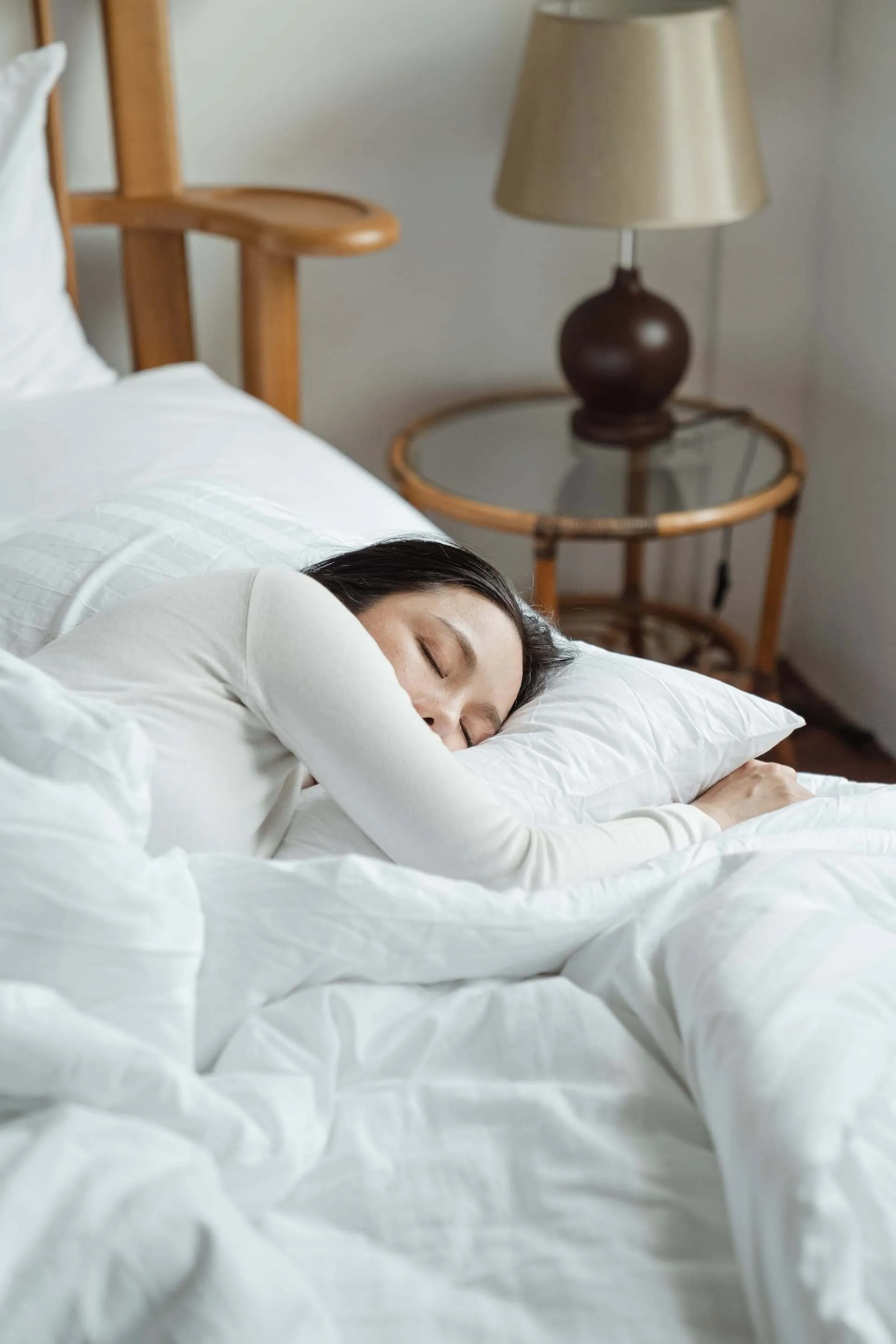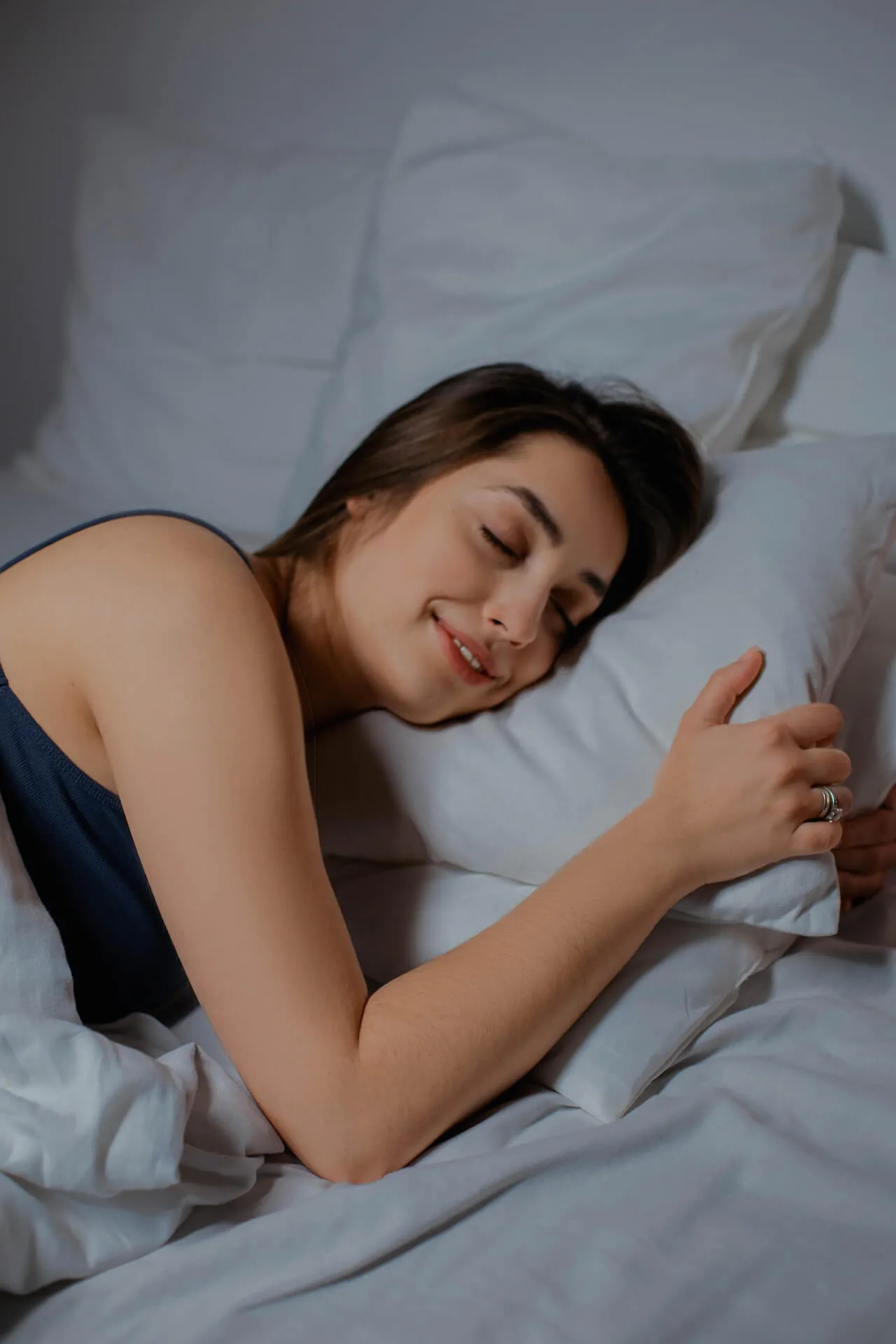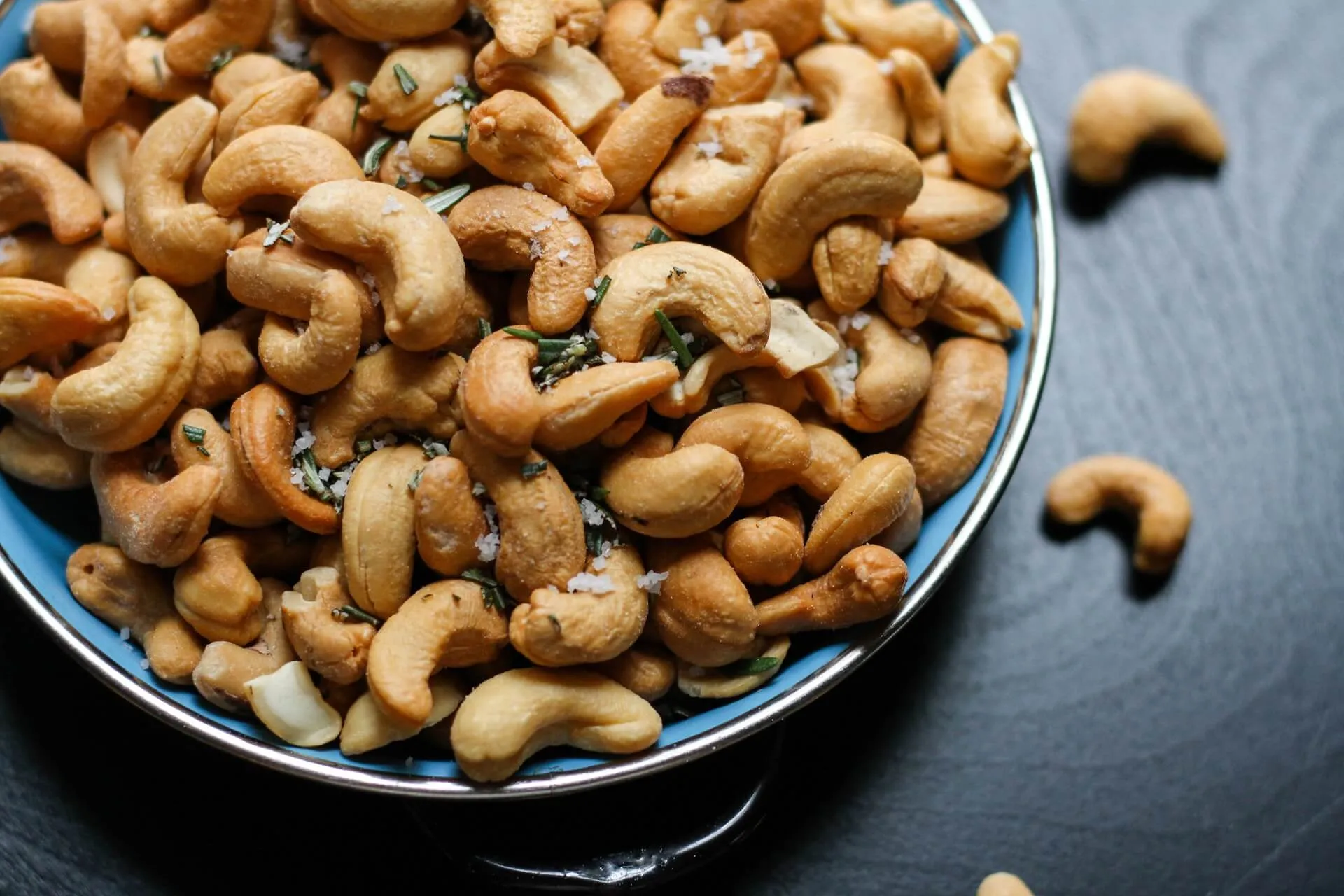Sometimes, you have to go to sleep after eating late, but are there any negative health effects of doing this? Every once in a while will likely not harm your sleep, but if you're doing this regularly and noticing that you’re not sleeping well, you may want to see if you can adjust your schedule to prevent it from worsening.
Sleeping immediately after eating can negatively affect sleep quality and contribute to other conditions like indigestion. On the other hand, there are situations where eating before bed can be beneficial or even health-promoting, such as stabilizing blood sugar levels.
Poor sleep has been associated with medical conditions like heart disease and Type 2 diabetes.
Let’s explore the complex relationship between food and sleep, highlighting the potential risks and benefits of eating before bed and providing clear directions for your nightly eating habits.
{{mid-cta}}
The Link Between Food and Sleep
Food and sleep are closely linked. The timing and type of food you eat affect the quality of your sleep. Eating stimulates the production of insulin, which can influence your body's circadian rhythms and impact your sleep-wake cycle.
Additionally, certain foods contain compounds that can either promote or hinder sleep. For instance, foods rich in tryptophan, such as turkey, milk, and nuts, can promote sleep by increasing the production of serotonin and melatonin, two hormones that help regulate sleep.
On the other hand, foods and beverages high in caffeine, such as coffee, chocolate, and some teas, can hinder sleep by stimulating the nervous system and keeping you alert. Similarly, spicy and acidic foods can cause indigestion or acid reflux, which may disrupt your sleep cycle. Alcohol is another major sleep hindrance as it can cause poor sleep quality even if you’re getting enough sleep.
Plus, late night digestion can also interfere with sleep. When you eat, your body needs time to digest the food, and lying down immediately after eating can cause discomfort and indigestion.
<div class="pro-tip"><strong>Learn More: </strong><a href=how-to-get-rid-of-sleep-apnea>How To Get Rid Of Sleep Apnea: 9 Lifestyle Changes</a>.</div>
When to Stop Eating Before Bed
Determining the ideal time to stop eating before bed can significantly impact your sleep quality. Sleep medicine experts generally recommend finishing your last meal with enough time to “rest and digest” before bed — at least two to three hours before bed to allow sufficient time for digestion.
Eating too close to bedtime can cause issues like acid reflux and heartburn, disrupting your sleep. One contributor to heartburn is pressure in the abdominal region, exacerbated by lying down. If you have to eat a late-night meal and you're worried about indigestion, try to put a pillow behind your back to avoid triggering worsened symptoms.
Plan on eating dinner two to three hours before you hit the sack. Planning your meals and snacks earlier in the evening can improve your digestion and sleep hygiene.
What Are the Side Effects of Sleeping After Eating?
Sleeping immediately after eating can lead to several negative side effects, including:
- Disruptions to your sleep quality: The digestive process may interfere with your ability to fall and stay asleep, leading to restless nights.
- Gaining weight: Late-night eating may contribute to weight gain due to additional calorie intake and reduced physical activity.
- Acid reflux and heartburn: Lying down after eating may cause stomach acids to flow back into the esophagus, leading to discomfort and disrupted sleep, especially if you have a history of heartburn.
Potential Benefits of Sleeping After Eating
While there are risks, there are also potential benefits to eating before bed, such as:
- Bedtime snacks can help you fall asleep faster: Small, healthy snacks can promote sleep by providing nutrients that induce relaxation and sleepiness. For example, foods rich in tryptophan, such as turkey, nuts, and dairy products, can increase the production of serotonin and melatonin, hormones that help regulate sleep. Complex carbohydrates like whole-grain crackers or a small bowl of oatmeal can also boost serotonin levels, promoting a sense of calm and making it easier to fall asleep. Additionally, foods like chamomile tea or a banana can have a mild sedative effect, further aiding the transition to sleep.
- Stabilize blood sugar: Eating a balanced snack before bed can prevent blood sugar drops at night, which is particularly beneficial for folks with diabetes or low blood sugar conditions (hypoglycemia). When blood sugar levels drop too low, the body releases hormones such as adrenaline and cortisol to raise them back up, which can cause you to wake up feeling anxious or jittery. A bedtime snack that includes a mix of protein and complex carbohydrates to help maintain steady blood sugar levels throughout the night. For instance, a small serving of Greek yogurt with a handful of nuts or a slice of whole-grain toast with almond butter provides a sustained release of energy, preventing nighttime hypoglycemia and contributing to uninterrupted, restful sleep.
What to Eat and Avoid Before Going to Bed

Choosing the right foods before bed can improve your sleep quality. Here's what to eat and avoid:
What to Eat
- Lean Meats: Lean meats, such as chicken or turkey, can help you sleep better because they provide high-quality protein without red meat's heaviness and high-fat content. Turkey, in particular, contains tryptophan, an amino acid that the body uses to produce serotonin and melatonin, hormones that regulate sleep. Consuming lean meats can also stabilize blood sugar levels, preventing nighttime awakenings caused by hunger or blood sugar dips.
- Eggs: Eggs are an excellent source of protein that is easy to digest, making them a great option for a pre-bedtime snack. The protein in eggs can help maintain steady blood sugar levels overnight, reducing the chances of waking up due to hunger. Additionally, eggs contain small amounts of tryptophan, which can contribute to producing sleep-regulating hormones. Eating eggs can also provide the body with essential nutrients like choline, which supports brain health and may promote more restful sleep.
- Nuts: Nuts, particularly almonds and walnuts, contain melatonin, a hormone that regulates the sleep-wake cycle. Consuming these nuts can increase melatonin levels in the body, promoting a natural, restful sleep. Additionally, nuts are rich in magnesium and zinc, both of which have been shown to improve sleep quality. The healthy fats and protein in nuts also help keep you full throughout the night, preventing disturbances caused by hunger.
- Fruits: Certain fruits, such as bananas, kiwis, and cherries, can help you fall asleep faster due to their natural sleep-inducing properties. Bananas are rich in magnesium and potassium, which help relax muscles and promote a calm state conducive to sleep. Kiwis contain antioxidants and serotonin, which can improve sleep onset and duration. Cherries, especially tart cherries, are one of the few natural sources of melatonin, which can help regulate your sleep cycle and improve overall sleep quality. Including these fruits in your evening routine can support a more restful night’s sleep.
What to Avoid
- Heavy Foods: A large meal might decrease your energy levels and increase tiredness, but it can prevent a good night’s sleep. Heavy meals are hard to digest and require more blood flow to be redirected to your digestive system. Eating a big meal before bed can cause discomfort and bloating, making it difficult to fall asleep. Additionally, your body must work harder to digest a heavy meal, which can keep you awake and disturb your rest.5
- Spicy and Acidic Foods: Spicy and acidic foods can cause heartburn and disrupt sleep. These foods can irritate the lining of the stomach and esophagus, leading to discomfort and acid reflux, especially when lying down. This can interrupt your sleep and cause you to wake up feeling uncomfortable.5
- Caffeine: Caffeine, found in coffee, tea, and some sodas, can keep you awake if you’re affected by its stimulating properties. As a stimulant, caffeine blocks the effects of adenosine, a brain chemical that promotes sleep, making it harder for you to fall asleep and stay asleep. It's best to avoid caffeine in the afternoon and evening to ensure it doesn't interfere with your sleep.5
- Sugary Foods: Sugary foods can cause spikes and crashes in blood sugar, leading to restless sleep. High-sugar foods can rapidly increase blood sugar, followed by a sharp drop, which can wake you up at night. This fluctuation in blood sugar levels can also affect your overall sleep quality.5
- Alcohol: While alcohol may initially make you sleepy, it can disrupt the sleep cycle later in the night. Alcohol can interfere with the REM (rapid eye movement) stage of sleep, which is crucial for restorative sleep. As the body metabolizes alcohol, it can cause frequent awakenings and a less restful night’s sleep, leaving you feeling groggy and unrefreshed in the morning.5
Using a CGM with Signos: Real-Time Data, Backed by AI
Signos pairs a real-time glucose biosensor with AI trained on tens of millions of data points to deliver personalized, science-backed guidance for weight management and health. See exactly how your body responds, and take action.
Learn how it works. Ready to get started? Join now.
<div class="pro-tip"><strong>Learn More: </strong><a href=how-to-improve-rem-sleep>REM Sleep: What It Is + 10 Proven Ways to Improve It</a>.</div>
Topics discussed in this article:
References
- Vernia, F., Di Ruscio, M., Ciccone, A., Viscido, A., Frieri, G., Stefanelli, G., Latella, G. (2021). Sleep disorders related to nutrition and digestive diseases: a neglected clinical condition. International Journal of Medical Sciences, 18(3), 593-603. https://doi.org/10.7150/ijms.45512.
- Zuraikat FM, Wood RA, Barragán R, St-Onge MP. Sleep and Diet: Mounting Evidence of a Cyclical Relationship. Annu Rev Nutr. 2021 Oct 11;41:309-332. doi: 10.1146/annurev-nutr-120420-021719. Epub 2021 Aug 4. PMID: 34348025; PMCID: PMC8511346.
- Wu W, Zhao A, Szeto IM, Wang Y, Meng L, Li T, Zhang J, Wang M, Tian Z, Zhang Y. Diet quality, consumption of seafood and eggs are associated with sleep quality among Chinese urban adults: A cross-sectional study in eight cities of China. Food Sci Nutr. 2019 May 15;7(6):2091-2102. doi: 10.1002/fsn3.1050. PMID: 31289657; PMCID: PMC6593378.
- Ji X, Grandner MA, Liu J. The relationship between micronutrient status and sleep patterns: a systematic review. Public Health Nutr. 2017 Mar;20(4):687-701. doi: 10.1017/S1368980016002603. Epub 2016 Oct 5. PMID: 27702409; PMCID: PMC5675071.
- Pattnaik H, Mir M, Boike S, Kashyap R, Khan SA, Surani S. Nutritional Elements in Sleep. Cureus. 2022 Dec 21;14(12):e32803. doi: 10.7759/cureus.32803. PMID: 36694494; PMCID: PMC9859770.
- Meng X, Li Y, Li S, Zhou Y, Gan RY, Xu DP, Li HB. Dietary Sources and Bioactivities of Melatonin. Nutrients. 2017 Apr 7;9(4):367. doi: 10.3390/nu9040367. PMID: 28387721; PMCID: PMC5409706.


.webp)
.webp)
.svg)










.svg)
.svg)
.svg)
.svg)
.svg)
.svg)
.svg)
